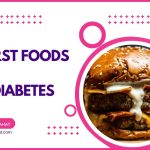Bloating after Pooping: 8 Main Causes (Doctor Explains)
Our content is not intended nor recommended as a substitute for medical advice by your doctor. Use for informational purposes only.
Bloating is common after ingesting certain foods, such as lactose or fructose. Bloating after pooping is particularly irritable bowel syndrome, chronic constipation, and lactose intolerance.
The possible causes of persistent bloating after pooping include:
- Eating too many gassy foods or drinks.
- Food intolerance or food allergies, such as lactose intolerance.
- Irritable bowel syndrome (IBS).
- Chronic constipation.
- Celiac disease.
- Small intestinal bacterial overgrowth (SIBO).
- Others, such as pregnancy, menstruation, intra-abdominal cancers, etc.
1 . Too many gassy foods or drinks.
As humans, our gut is not wired to handle excessive amounts of certain foods, particularly vegetables and fruits.
So, the bloating after pooping can be a sign of overeating certain foods beyond the ability of your digestive system to handle them.
When excess gassy foods enter your digestive system, the amount left undigested is rapidly fermented by gut microbes in a process called (fermentation).
Fermentation releases lots of gas which cause the bloating sensation.
Why does bloating sensation occur after pooping?
The bloating sensation is often present for several hours or days after eating the offending foods.
But it usually worsens after pooping due to the straining and increased colonic contractions during the bowel movement.
So, the bloating and discomfort exacerbate during and after pooping, leading to an unpleasant gut feeling every time you poop.
Common offending foods.
Foods that cause gas and bloating after pooping are often those with the following:
- Short-chain carbohydrates rapidly and easily fermentable by gut bacteria include lactose (in milk and dairy) and fructose (in most fruits).
- Insoluble fibers: such as vegetables and whole grains.
- Carbonation leads to the release of too much gas inside your gut, as with any carbonated drink.
- Too much fat.
The most common food groups that are famous for causing bloating after pooping are:
- Milk and dairy products.
- Vegetables such as broccoli, cauliflower, onions, etc.
- Some fruits, such as apples, bananas, and apricots.
- Whole grains such as brown rice, whole wheat, oats, etc.
- Legumes such as beans, peas, etc.
- Too much fat or fatty foods.
- Gassy drinks such as carbonated beverages, medications, etc.
- Chewing gum and artificial sweeteners.
The table below illustrates the foods that are most frequently associated with gas and bloating after pooping (reference):
How to know if foods are the cause of bloating after pooping?
Sometimes, defining a pattern or certain offending foods that cause bloating after pooping is difficult.
The symptoms of excess gassy foods may also overlap with other diseases, such as food intolerance and irritable bowel syndrome.
Here are some tips that may help the differentiation:
- The symptoms are not persistent. Bloating after pooping may occur occasionally and may disappear for weeks or months.
- Bloating starts after changing your usual food pattern or traveling elsewhere.
- The best way to spot the offending food is to use a food diary (tracking the types of food and your symptom pattern over a while).
- The lack of symptoms suggests other diseases, such as recurrent abdominal pain and bowel habit changes (constipation or diarrhea).
- The symptoms are not only related to the type of food, but also it is related to its amounts. For example, one banana may not cause symptoms, while eating four bananas causes bloating.
2. Lactose intolerance.
As we age, we may lose the ability to digest lactose (found in milk, ice cream, and other dairy products).
The phenomenon of decreased ability as we become adults is called (primary or essential lactase deficiency).
And this is not a rare condition. The majority of the world population (65%) has lactose intolerance.
Symptoms of lactose intolerance:
- The symptoms are often intermittent and related to consuming milk, ice cream, and other dairy products.
- The most common symptom is excess gas all the time and after pooping.
- The bloating sensation may remain after bowel movements.
- Nausea.
- Diarrhea.
- Bulky, frothy, or watery stool (especially in children).
- Recurrent abdominal pain.
Learn More:
Lactose intolerance 101: causes, types, symptoms, and treatment.
3. Other forms of food intolerance and allergy.
Lactose intolerance is the most common form of food intolerance in adults. However, it is not the only food that can cause bloating after pooping.
Other forms of food-related reactions can cause recurrent bloating.
Food intolerance is defiance as difficulty digesting certain foods (mainly due to lacking one or more digestive enzymes).
Another form of food-related reaction is called (food allergy). In this type, An immune-mediated reaction to certain foods or constituents leads to allergic and digestive symptoms.
The table below illustrates the difference between the two conditions and common examples.
Learn more about food intolerance.
Learn more about food allergies.
4. Irritable bowel syndrome.
Irritable bowel disease is the most common gastrointestinal disease ever. Alone, it constitutes about 40% of gastroenterologist clinic visits.
The disease is widespread, affecting about 10-20% of people. It is a (functional) disease, meaning no specific lesion or abnormality is detected.
And it is one of the most common causes of bloating and discomfort after a bowel movement.
According to research, 76% of IBS patients may suffer from bloating (reference).
Symptoms of IBS:
- Recurrent abdominal pain at least one day per week.
- The onset of pain is often associated with defecation (AKA, pain, and bloating may decrease or increase after pooping).
- Recurrent diarrhea or constipation, or both.
- Excess gas and discomfort.
- The symptoms often either improve or get worse after pooping.
- The symptoms must be chronic (at least 3 to 6 months). See how IBS is diagnosed?
Learn more about bloating and IBS (causes and offending foods).
5. Chronic constipation.
Chronic constipation is another widespread disease (especially among the elderly and females).
With constipation, it is difficult to pass stools. As a result, straining and prolonged toilet time are common in constipation people. And this leads to a bloating sensation after you poop.
Some studies estimate that about 60.8% of people with chronic constipation have bloat.
Another cause of bloating is constipation treatments. If taken in excess, osmotic laxatives such as lactulose may cause bloating and distension.
If you consistently suffer from bloating with constipation, consult your doctor about the best options for treating both conditions and the role of your current medication in bloating.
6. SIBO (small intestinal bacterial overgrowth)
SIBO (small intestinal bacterial overgrowth) occurs when there is an abnormal increase in the number of bacteria residing in your small intestine.
As a result, these bacteria disturb digestion, produce excessive gas, and may cause malabsorption.
SIBO occurs when a surgery, antibiotic, or disease disturbs the natural balance of bacteria inside your small intestine. SIBO often occurs secondary to abdominal surgery, Crohn’s disease, celiac disease, diabetes mellitus, etc. Learn More.
The excess gas produced by the overgrown bacteria is the cause of recurrent bloating after pooping.
Symptoms:
- Recurrent abdominal pain.
- Loss of appetite.
- Recurrent or persistent bloating and gas.
- Nausea.
- Uncomfortable feeling and bloating after eating or pooping.
- Malnutrition.
- Diarrhea.
- Weight loss.
7. Celiac disease.
Celiac disease is an allergic condition to gluten protein found in wheat, rye, or barley foods.
When gluten enters your small intestine, a severe allergic reaction occurs, leading to a loss of the ability of the intestine to absorb food (malabsorption).
As a result, diarrhea, abdominal pain, bloating, and bowel habit changes occur.
The prevalence of celiac disease is around 1% of the population. It often starts in young adults (between the ages of 20 and 30) (reference).
Symptoms:
- Recurrent diarrhea or watery stools.
- Persistent bloating (before and after pooping).
- Stomach aches.
- Farting (flatulence).
- Indigestion.
- Nausea and anorexia.
- Rarely is constipation.
- Persistent fatigue and low energy.
- Weight loss.
- Skin rashes.
- Symptoms of anemia (shortness of breath, headache, dizziness, fast heartbeats, and pale skin).
8. Others.
- Functional dyspepsia.
- Females’ hormonal fluctuations (during menses, pregnancy, premenstrual syndrome, and polycystic ovary syndrome.
- Medications such as laxatives, metformin, antibiotics, and others.
- Enlarged abdominal organs such as enlarged liver or spleen.
- Abdominal obesity (increased belly fat).
- Pelvic inflammatory disease.
- Crohn’s disease.
- Diverticular disease.
- Intraabdominal cancers (ovary, colon, stomach, and others).
- Evidence-based
- Written by a doctor.

Related Posts:
- Bloated as Pregnant? 6 Main Causes & Treatments.
- 5 Main causes of abdominal pain and blood in the urine
- 5 Main Causes of Throwing up Feeling after Eating…
- Clear Urine with Bubbles: 6 Main Causes & When to Worry
- Tea-colored Urine: 5 Main Causes & When to Worry
- Marked Alkaline Phosphatase Elevation (levels over…










